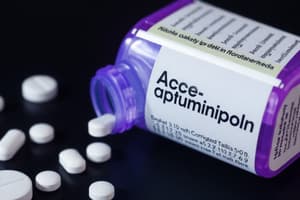Podcast
Questions and Answers
What is required for patients wishing to refuse transport after BLS administration of naloxone?
What is required for patients wishing to refuse transport after BLS administration of naloxone?
- Medical consultation with a base station physician (correct)
- A brief medical consultation with a base station physician
- A thorough physical examination by the BLS clinician
- Written consent from the patient
What is the trade name for nitroglycerin?
What is the trade name for nitroglycerin?
- Not Applicable (correct)
- Adcirca
- Viagra
- Revatio
What is the maximum number of doses of nitroglycerin that can be administered?
What is the maximum number of doses of nitroglycerin that can be administered?
- Three doses (correct)
- Two doses
- One dose
- Four doses
What is the dosage of nitroglycerin for pediatric patients?
What is the dosage of nitroglycerin for pediatric patients?
What is the indication for administering oral glucose?
What is the indication for administering oral glucose?
What is the dosage of oral glucose for adults?
What is the dosage of oral glucose for adults?
What is the effect of high concentrations of oxygen on COPD patients?
What is the effect of high concentrations of oxygen on COPD patients?
What is the minimum liter flow for a non-breather (NRB) face mask?
What is the minimum liter flow for a non-breather (NRB) face mask?
What is the dosage of oxygen for adults via nasal cannula?
What is the dosage of oxygen for adults via nasal cannula?
What is the purpose of administering oxygen?
What is the purpose of administering oxygen?
What is the dosage of epinephrine for patients 5 years of age or greater?
What is the dosage of epinephrine for patients 5 years of age or greater?
Which of the following is a contraindication for administering acetaminophen to a patient?
Which of the following is a contraindication for administering acetaminophen to a patient?
What is the indication for administering epinephrine to patients with severe asthma?
What is the indication for administering epinephrine to patients with severe asthma?
What is the onset of action of naloxone when administered intranasally?
What is the onset of action of naloxone when administered intranasally?
What is the recommended dose of acetaminophen for a 4-year-old patient?
What is the recommended dose of acetaminophen for a 4-year-old patient?
What is the contraindication for administering naloxone?
What is the contraindication for administering naloxone?
What is the maximum dose of acetaminophen that can be administered to a 13-year-old patient?
What is the maximum dose of acetaminophen that can be administered to a 13-year-old patient?
What is the maximum dose of naloxone that can be administered in one nare?
What is the maximum dose of naloxone that can be administered in one nare?
Why is it important to use a unit dose of acetaminophen?
Why is it important to use a unit dose of acetaminophen?
What is the duration of action of naloxone?
What is the duration of action of naloxone?
What is a precaution to consider when administering acetaminophen to a patient?
What is a precaution to consider when administering acetaminophen to a patient?
What is the adverse effect of naloxone?
What is the adverse effect of naloxone?
What is a contraindication for administering acetaminophen to a patient less than 3 months of age?
What is a contraindication for administering acetaminophen to a patient less than 3 months of age?
What is the indication for administering epinephrine auto-injector?
What is the indication for administering epinephrine auto-injector?
What is the recommended form of acetaminophen for a 13-year-old patient?
What is the recommended form of acetaminophen for a 13-year-old patient?
Why is it important to assess the patient's ability to swallow or take medications by mouth?
Why is it important to assess the patient's ability to swallow or take medications by mouth?
What is the dosage of epinephrine auto-injector for patients less than 5 years of age?
What is the dosage of epinephrine auto-injector for patients less than 5 years of age?
What is the precaution for administering naloxone?
What is the precaution for administering naloxone?
What is the primary indication for administering activated charcoal?
What is the primary indication for administering activated charcoal?
What is the maximum dose of albuterol that can be administered to a pediatric patient over a 30-minute period?
What is the maximum dose of albuterol that can be administered to a pediatric patient over a 30-minute period?
What is the contraindication for administering aspirin to a patient?
What is the contraindication for administering aspirin to a patient?
What is the primary indication for administering epinephrine?
What is the primary indication for administering epinephrine?
What is the preparation of activated charcoal?
What is the preparation of activated charcoal?
What is the adverse effect of administering albuterol?
What is the adverse effect of administering albuterol?
What is the precaution for administering aspirin?
What is the precaution for administering aspirin?
What is the dosage of epinephrine for a pediatric patient?
What is the dosage of epinephrine for a pediatric patient?
What is the contraindication for administering activated charcoal?
What is the contraindication for administering activated charcoal?
What is the pharmacology of aspirin?
What is the pharmacology of aspirin?
Flashcards are hidden until you start studying
Study Notes
AMES: Tylenol
- Indications: Patients 3 months and older with mild to moderate discomfort (1-5 on FACES scale) or fever (EMS-documented temperature ≥100.4°F/38°C)
- Adverse Effects: Not clinically significant
- Contraindications:
- Head Injury
- Hypotension
- Administration of acetaminophen within the previous 4 hours
- Inability to swallow or take medications by mouth
- Respiratory distress
- Persistent vomiting
- Known or suspected liver disease
- Allergy to acetaminophen
- Patients less than 3 months of age
- Preparations: Unit Dose Only (DO NOT USE MULTIDOSE BOTTLE OF LIQUID); Unit dose 160 mg/5 mL liquid or 325 mg pill/tablet
- Dosage:
- Less than 3 months of age: Not indicated
- 3 months to 2 years of age: depends on age and weight
- 2-4 years: Unit dose 160 mg/5 mL
- 5-12 years: TWO unit doses of 160 mg/5 mL each
- 13 years and above: FOUR unit doses of 160 mg/5 mL each or 325 mg pill/tablet x2
BLS Pharmacology: ACTIVATED CHARCOAL (WITHOUT SORBITOL)
- Indications: Poisoning by mouth
- Adverse Effects: May indirectly induce vomiting and cause nausea
- Contraindications:
- Altered mental status
- Patients who have received an emetic
- Preparations:
- 25 grams/125 mL bottle
- 50 grams/250 mL bottle
- Dosage:
- Adult: 1 gram/kg PO
- Pediatric: 1 gram/kg PO
BLS Pharmacology: ALBUTEROL
- Indications:
- Signs and symptoms of respiratory distress
- Bronchospasm/wheezing associated with:
- Asthma
- COPD/emphysema
- Allergic reactions (anaphylaxis)
- Adverse Effects:
- Tachycardia/palpitations
- Hypertension
- Angina
- Nervousness/anxiety
- Tremors
- Dizziness
- Headache
- Sweating
- Nausea/vomiting
- Sore throat
- Precautions: May cause severe bronchospasm from repeated excessive use
- Contraindications: Known hypersensitivity
- Preparations:
- Hand-held (unit dose) aerosol inhaler
- Ampule for nebulizer
- Dosage:
- Adult: Maximum of 2 doses (4 puffs) over a 30-minute period
- Pediatric: Maximum of 2 doses (4 puffs) over a 30-minute period
BLS Pharmacology: ASPIRIN
- Indications: Suspected Acute Coronary Syndrome and/or ST Elevation MI (STEMI)
- Contraindications:
- Known hypersensitivity
- Patients who receive a full dose (324 mg) of aspirin prior to EMS arrival
- Adverse Effects:
- Heartburn
- Nausea and vomiting
- Wheezing
- Precautions: GI bleeding and upset
- Dosage:
- Adult: 324 mg or 325 mg chewed
- Pediatric: Not indicated
BLS Pharmacology: EPINEPHRINE (1 mg/mL)
- Indications:
- Moderate to severe allergic reaction with respiratory distress
- Mild allergic reaction with history of life-threatening allergic reaction
- Patients with severe asthma
- Adverse Effects:
- Tachycardia/palpitations
- Angina
- Headache
- Nausea/vomiting
- Dizziness
- Hypertension
- Nervousness/anxiety
- Tremors
- Precautions: Medical consultation must be obtained before administering EMS service's manual epinephrine or EMS service's auto-injector to asthma patients with pregnancy or cardiac history
- Contraindications: None in the presence of anaphylaxis
- Preparations: Epinephrine (Patient prescribed or EMS supplied)
- Dosage:
- Patients 5 years of age or greater: 0.5 mg in 0.5 mL IM in lateral thigh
- Patients less than 5 years of age: 0.15 mg in 0.15 mL IM in lateral thigh
BLS Pharmacology: EPINEPHRINE AUTO-INJECTOR
- Indications:
- Moderate to severe allergic reaction with respiratory distress
- Mild allergic reaction with history of life-threatening allergic reaction
- Patients with severe asthma
- Adverse Effects:
- Tachycardia/palpitations
- Angina
- Headache
- Nausea/vomiting
- Dizziness
- Hypertension
- Nervousness/anxiety
- Tremors
- Precautions: Medical consultation must be obtained before administering EMS service's manual epinephrine or EMS service's auto-injector to asthma patients with pregnancy or cardiac history
- Contraindications: None in the presence of anaphylaxis
- Preparations: Epinephrine Auto-injector (single or multi-dose) only (Patient prescribed or EMS supplied)
- Dosage:
- Less than 5 years of age: 0.15 mg IM in the lateral thigh via epinephrine auto-injector
- 5 years and greater: 0.3 mg IM in the lateral thigh via epinephrine auto-injector
BLS Pharmacology: NALOXONE PUBLIC SAFETY AND EMR
- Indications: To reverse respiratory depression induced by opioid/narcotic agent
- Contraindications: Patients under 28 days of age
- Adverse Effects: Opioid withdrawal
- Precautions:
- Naloxone may induce opiate withdrawal in patients who are physically dependent on opioids
- Certain drugs may require much higher doses of naloxone for reversal than are currently used
- Should be administered and titrated so respiratory efforts return, but not intended to restore full consciousness
- Intranasal naloxone must be administered via nasal atomizer
- Dosage:
- Adult: 2 mg IN, dividing administration of the dose equally between the nares to a maximum of 1 mL per nare, OR 4 mg/0.1 mL IN in one nare
- Pediatric: 2 mg IN, dividing administration of the dose equally between the nares to a maximum of 1 mL per nare, OR 4 mg/0.1 mL IN in one nare
BLS Pharmacology: NITROGLYCERIN
- Indications: Chest pain
- Adverse Effects:
- Hypotension
- Headache
- Dizziness
- Tachycardia
- Precautions:
- BLS clinician may only administer patient prescribed sublingual nitroglycerin
- Reassess blood pressure before and after administration
- If systolic blood pressure drops more than 20 mmHg per dose of nitroglycerin given, obtain medical consultation before further administration
- Contraindications:
- Blood pressure below 90 mmHg systolic
- Heart rate less than 60 or greater than 150 bpm
- Medication not prescribed for the patient
- Pediatric patient under age 13
- Any patient having taken medication for Pulmonary Artery Hypertension (e.g., Adcirca or Revatio) or erectile dysfunction (e.g., Viagra, Levitra, or Cialis) within the past 48 hours
- Dosage:
- Adult: 0.4 mg sublingually (one tablet or one spray)
- Pediatric: Nitroglycerin contraindicated for children under age 13
Studying That Suits You
Use AI to generate personalized quizzes and flashcards to suit your learning preferences.



